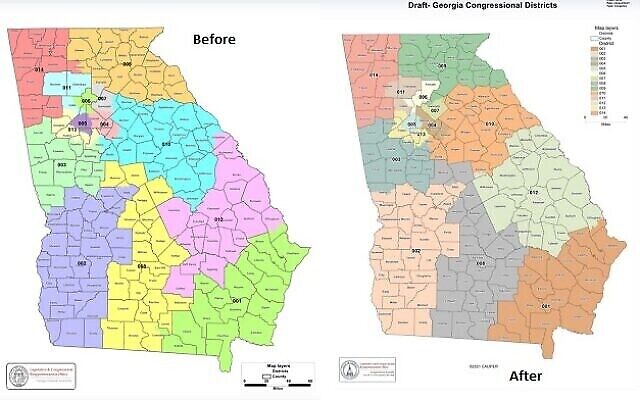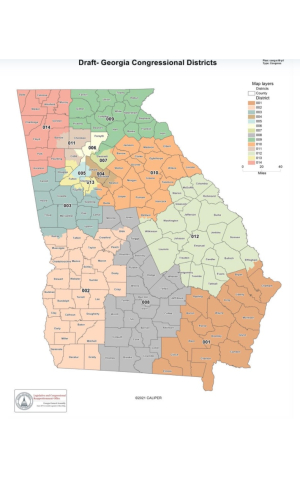YIR: Redistricting Alters Georgia Political Landscape
December 2021: The client and the setting for the trial was like nothing the Jewish attorney from Atlanta has experienced in a career spanning more than three decades.
Dave Schechter is a veteran journalist whose career includes writing and producing reports from Israel and elsewhere in the Middle East.

Georgia’s 2022 election stew became spicier in November, when the Republican-controlled state House and Senate redrew the borders of the legislative and congressional districts.
The maps, redrawn every 10 years following the Census, await Republican Gov. Brian Kemp’s signature. Pending the outcome of anticipated court challenges, these maps will remain in effect for a decade. The General Assembly will deal with county commission and school board districts when it convenes in January.
Georgia’s population has increased by 1 million since 2010, to 10.7 million residents, due largely to minority growth in metro Atlanta. The maps reflect the population shift toward the Atlanta area, and away from middle and South Georgia. Congressional districts will average roughly 765,000 residents: state Senate districts 191,000, and state House districts 59,500.

By moving around liberal and conservative sections of metro area counties, Republicans found a way to improve on their 8-6 margin in Georgia’s congressional delegation. The 6th district — a Republican stronghold that Democrats flipped in 2018 and held in 2020 — will again be GOP-friendly, while mapmakers ceded to Democrats the 7th district seat, they flipped in 2020.
Democrat Lucy McBath, currently representing the 6th district, announced that she would run in 2022 in the 7th district, already represented by Democrat Carolyn Bourdeaux, a tilt that could highlight tensions between their party’s moderate and progressive wings.
Several Republicans already had filed to run in the 6th and with McBath gone, more may enter the race. The GOP primary winner will be favored to win the general election.
The maps suggest that Republicans will maintain their majorities in the state House and Senate, though Democrats may make inroads. Republicans currently hold a 103-77 margin over Democrats in the state House and a 34-21 advantage in the state Senate.
Democratic state Rep. Mike Wilensky, the lone Jewish member of the General Assembly, saw his current 79th district’s borders change slightly and given a new designation. Wilensky will run for re-election in what will be district 80. “I am running for House district 80 and look forward to being the representative for Dunwoody [except for two precincts], Doraville, and a little bit of Chamblee,” he told the AJT.
Georgia’s maps no longer require Justice Department approval. In 2013, the U.S. Supreme Court struck down the portion of the Voting Rights Act that required pre-clearance in states with a history of discrimination against minorities. The Supreme Court further ruled in June 2019 that federal courts cannot intervene in claims of deliberately partisan redistricting, sometimes referred to as “gerrymandering.”
- Year in Review
- Local
- Dave Schechter
- Governor Brian P. Kemp
- Lt. Gov. Geoff Duncan
- redistricting
- congressional districts
- Georgia Legislative and Congressional Reapportionment Office
- House
- Senate
- Census
- General Assembly
- county commission
- school board districts
- 6th District
- 7th district
- Lucy McBath
- Carolyn Bourdeaux
- Rep. Mike Wilensky
- dunwoody
- Doraville
- Chamblee
- Justice Department
- Voting Rights Act
- U.S. Supreme Court
- Discrimination
- minorities



comments